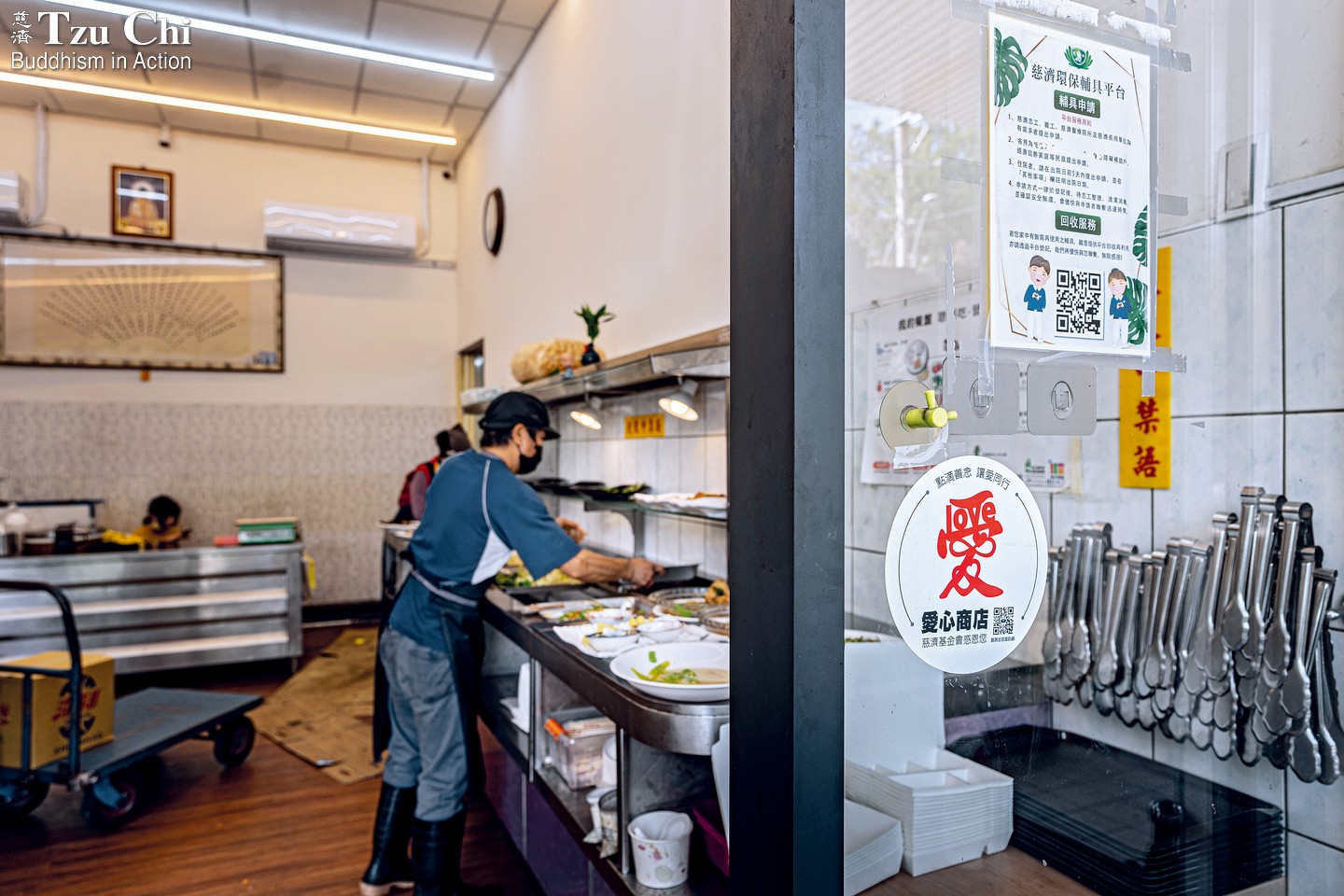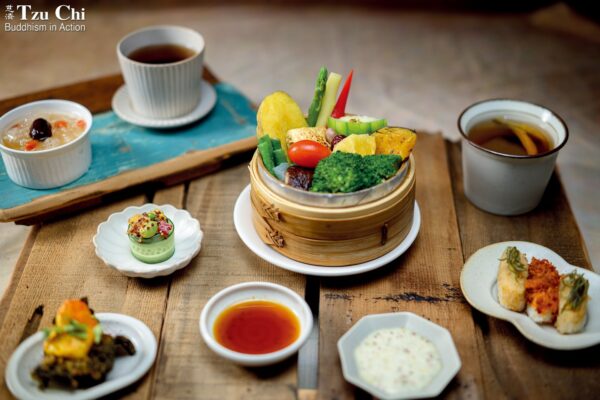By Yeh Tzu-hao
Translated by Wu Hsiao-ting
Photos by Hsiao Yiu-hwa
Store owners who host a Tzu Chi coin bank can also assist needy individuals by referring them to Tzu Chi for help or sharing information about the foundation’s services. They can handle their store operations while keeping an eye out for those in distress.

A Loving Store sticker is displayed at participating businesses for easy identification.
“When we visit stores to promote our Loving Store campaign, we start by introducing our assistive device program and Neighbor Helping Neighbor hotline. Only after that do we talk about Loving Stores,” explained Tzu Chi volunteer Li Guan-hui (李冠慧), residing in Taichung City, central Taiwan. She is the liaison for the Loving Store endeavor in the city’s Xitun District. She believes that a Loving Store volunteer team can do more than just visiting stores for the campaign; it’s also important to spread information about Tzu Chi’s services to help more people.
“I thought the Loving Store concept was a wonderful way to serve the public when Tzu Chi volunteers pitched the idea to us, so we decided to join,” shared Chen Xiu (陳秀), who operates a budget eatery in Xitun District with her husband. They became part of the Loving Store initiative a few months ago. Despite not making much profit from their business, the couple is generous in supporting public welfare.
Chen mentioned that the director general of the management committee for a nearby building visited and dined in her eatery a short while ago. During their conversation, the director spoke of an elderly woman who lived alone in the building and lacked support. To help her, the director began delivering food to her and even accompanied her to medical appointments. Hearing the story, Chen recalled that the volunteers involved in the Loving Store campaign had mentioned that if there was ever a need for assistance, they could report it to Tzu Chi. After learning more about the elderly woman’s situation, Chen contacted volunteer Dai Yu-qiu (戴玉秋) for help.
Dai forwarded the basic information of the elderly woman to a Tzu Chi social worker and joined fellow volunteers to visit the woman and assess her needs. The foundation applied for government long-term care services for the woman, including meal delivery. Since she had difficulty walking on her own, arrangements were also made for a quad cane and other equipment from Tzu Chi’s assistive device program to be delivered to her.
“Tzu Chi was very helpful; they provided assistance as promised,” said Chen. “If anyone needs help in the future, I will refer them to Tzu Chi again.” She said that she had learned that the elderly woman was now better off because of the care she was receiving, and felt genuinely happy for her.
This case of need discovered by the store owner convinced volunteer Li Guan-hui that she was right about this: “By collaborating with store owners, we can help establish a community safety net.”
Volunteering on weekends
Lin Cang-yi (林蒼義) and Cai Gui-feng (蔡貴鳳) run a successful vegetarian self-service restaurant in Xitun District. Their restaurant has adopted a Tzu Chi coin bank, along with donation collection boxes from other organizations. The couple wholeheartedly supports public welfare. “If customers lack coins for the donation containers, I can provide change for their bills,” Cai said.
The couple’s workload is heavy; apart from managing their restaurant, they also handle group meal orders. Lin, the chef, often starts work at 5 a.m. and doesn’t finish until 8 p.m. However, they’ve made it a point to take two days off per week since the start of their business journey.
During a recent visit, Tzu Chi volunteer Li Guan-hui delivered the previous month’s donation receipt to the restaurant. Seeing Li, Cai expressed admiration for her dedication to Tzu Chi work, saying, “Guan-hui is so busy, but she still finds time to volunteer. Since I have free time on weekends, I decided to join in!” For over a year, the couple has volunteered for Tzu Chi’s assistive device program.
Volunteering for the program often involves physically demanding tasks, like cleaning equipment or delivering devices. However, Cai handles these duties well, accustomed to lifting heavy items like boxed lunches or ingredients weighing around 20 to 30 kilograms (44-66 pounds). Lifting a hospital bed with male volunteers poses no problem for her.
Since joining the assistive device program, the couple often delivers such equipment to those in need alongside other volunteers. This experience deepens their understanding of the difficulties faced by needy individuals and increases their gratitude for their own circumstances. On one occasion, when delivering an oxygen concentrator, they were pleasantly surprised to encounter a regular customer, who was just as happy to see their familiar faces. Knowing how much the assistive device program can benefit those requiring such equipment, Cai has put up a poster promoting the program in their restaurant to raise awareness and enable such resources to reach more people in need.



